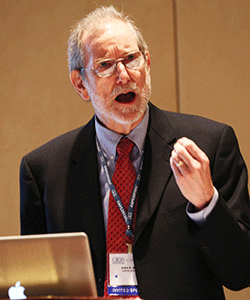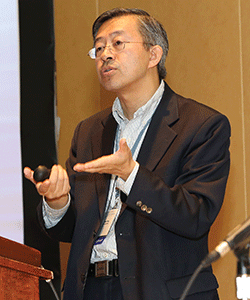Mastering Our Passions

James J. Gross, Stanford University, says studies show that people who suppress their emotions struggle with memory tasks, and also elevate the blood pressure of others around them.
The pursuit of emotion regulation is as timeless as it is universal. It was apparent to whoever wrote the age-old Hindu proverb, “Conquer your passions and you conquer the world.” And it was equally clear to the philosopher Descartes, who once advised, “The principal use of prudence or self-control is that it teaches us to be masters of our passions.” Wherever and whenever people have had strong feelings, they have also been struggling to keep them in check.
“Although emotions are often functional, they’re not always functional,” said James J. Gross of Stanford University, during a theme program on emotion regulation at the 25th APS Annual Convention. “This means that people sometimes need to regulate their emotions.”

Workers who are told to control emotions at work make more performance errors, says Alicia A. Grandey, Pennsylvania State University.
This need begins nearly at birth, as developmental psychologist John E. Bates of Indiana University explained. Research has shown that even babies less than a year old will direct attention elsewhere when their mothers present an upsetting facial expression, as a way of reducing any negative feelings. “So even at six months of age, babies are regulating emotions based on what they pay attention to,” Bates said.
Over the years Bates has studied the ways in which self-regulation correlates with behavioral adjustment in children. Studies have found that children with poor regulation skills — as assessed by certain structure tasks — go on to exhibit both externalizing and internalizing problems, such as aggression or anxiety. Of course not all bad behavior is the result of bad regulation. But on the whole, early indicators of self-control do seem to predict the development of social and emotional adjustment.
“My interest in this whole problem is not self-regulation, per se, it’s self-regulation as a tool for understanding development,” said Bates.
Gross’s work focuses on the strategies used by adults to control their emotions. In particular, his research has evaluated the efficacy of different theoretically defined forms of emotion regulation. One particularly interesting contrast is between emotional suppression and emotional reappraisal. With suppression, a person tries to inhibit how emotions are expressed; with reappraisal, a person tries to think differently about the situation that produced the feelings in the first place.

John E. Bates, Indiana University, says that even babies show some ability to regulate their emotions.
A large body of research shows that reappraisal is clearly the healthier approach in most situations. Unlike reappraisal, suppression creates both cognitive and social costs: in studies, people suppressing their emotions perform poorly on memory tasks, and also elevate the blood pressure of others around them. Compared with people who control emotions through reappraisal, people who suppress them have more negative emotions, less general well-being, fewer close social relationships, even poorer physical health.
“How we go about controlling or regulating our emotions matters, because some strategies are more helpful in particular situations than others,” said Gross. “We can all learn to better regulate our emotions, and doing so, I think, can help us change the world in ways that will make us, and our children and their children, healthier and more productive.”
Productivity is the central theme in the work of industrial-organizational psychologist Alicia A. Grandey of Pennsylvania State University. Grandey has studied the effects of forcing employees to control their feelings on the job — an area known as “emotional labor.” While so-called “service with a smile” does seem to produce economic benefits, the flipside is its potential to create personal turmoil.
In one study, Grandey and collaborators simulated a call center in which confederates on the other end of the line were either rude or polite. When test participants were told to be friendly they did regulate their emotions, but they also made more performance errors related to a math task — and those “employees” who handled particularly abusive callers made the most mistakes.
“It takes attentional focus to regulate your emotions,” said Grandey. “There’s some amount of resources not available for other tasks if you’re having to regulate your emotions.”

Yi-Yuan Tang, Texas Tech University, discusses a mindfulness training program that has proven to be effective in improving self-control under emotional duress.
The good news, according to Grandey’s work, is that some of the ill-effects of smiling on the job can be mitigated simply by offering employees a bonus to put on the happy face.
Money certainly isn’t the only method for better regulation. Yi-Yuan Tang of Texas Tech University described a mindfulness training that’s designed to improve self-control under emotional duress. He calls his approach the Integrative Body-Mind Training — a meditation technique with origins from Eastern contemplative traditions adjusted for the modern Western life.
“The basic idea is that we have people stay with themselves — have them create a state,” Tang said.
So far, the outcomes have been impressive. With only short-term training — roughly half an hour a day over five days — people introduced to Tang’s method show an improved ability to handle stress, a reduction in negative and increase in positive emotions, stronger immune functions, even enhanced neuroplasticity associated with self-control network in the brain (as detected in white matter changes). Tang has found that as few as five hours of mindfulness training can reduce smoking as much as 60 percent, compared to relaxation training control.
“If one has a better self-regulation ability… they’ll have better social behavior,” Tang said.
As true today as it’s ever been.
References
Gross, J. J. (2013). Emotion regulation: Taking stock and moving forward. Emotion, 13, 359-365.
Petersen, I. T., Bates, J. E., D’Onofrio, B. M., Coyne, C. A., Lansford, J. E., Dodge, K. A., … & Van Hulle, C. A. (2013). Language ability predicts the development of behavior problems in children. Journal of Abnormal Psychology, 122, 542–557.
Goldberg, L. S., & Grandey, A. A. (2007). Display rules versus display autonomy: Emotion regulation, emotional exhaustion, and task performance in a call center simulation. Journal of Occupational Health Psychology, 12, 301–318.
Tang, Y. Y., Ma, Y., Wang, J., Fan, Y., Feng, S., Lu, Q., … & Posner, M. I. (2007). Short-term meditation training improves attention and self-regulation. Proceedings of the National Academy of Sciences, 104, 17152–17156.
Tang, Y. Y., Rothbart, M. K., & Posner, M. I. (2012). Neural correlates of establishing, maintaining and switching brain states. Trends in Cognitive Science, 16, 330–337.





APS regularly opens certain online articles for discussion on our website. Effective February 2021, you must be a logged-in APS member to post comments. By posting a comment, you agree to our Community Guidelines and the display of your profile information, including your name and affiliation. Any opinions, findings, conclusions, or recommendations present in article comments are those of the writers and do not necessarily reflect the views of APS or the article’s author. For more information, please see our Community Guidelines.
Please login with your APS account to comment.